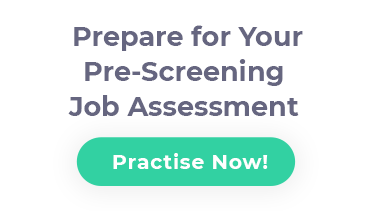Standard Chartered Bank Assessment Centre, Personality & Aptitude Tests, and Interview Process Preparation – 2025

About Standard Chartered
Standard Chartered is a British bank and financial services company that has existed for over 150 years. They operate in over 70 countries and 6 continents and employ nearly 70,000 people worldwide. They provide services to retail, corporate, and large corporate clients all over the world.
The British bank has bank teller and janitorial jobs all the way to high finance jobs in their corporate offices. This article will focus on the finance jobs at Standard Chartered as those in finance consider it a difficult, stressful interview and testing process.
What Is Standard Chartered’s Hiring Process?
Standard Chartered is a large company and receives a lot of applications, so they have a rigid, efficient hiring process. There are very few deviations from the hiring process as they have determined that their particular hiring process works great for finding the best candidates.
The hiring process will include the following steps:
- Job Application
- Strength Assessment
- Online Psychometric Tests
- Video Interview
- Assessment Centre
Standard Chartered Job Application
The job application is the easiest step of Standard Chartered’s hiring process. Applicants submit a resume, CV, cover letter, and answer some very basic questions about education and experience.
Standard Chartered’s Situational Strengths Test (SST)
The SST is sent immediately after the applicant submits their application to Standard Chartered. This test will identify the strengths and weaknesses of the candidate – it is essentially a situational personality test.
The test contains 18 hypothetical scenarios and questions. The applicant must rank the responses to each scenario from best to worst. These scenarios are common workplace issues that arise while working for Standard Chartered. The SST is surprisingly difficult as all the responses are acceptable and figuring out how to properly rank five different responses can prove extremely difficult.
Applicants that pass the test will receive an email asking them to take two more online tests within a few days to advance in the hiring process.
Standard Chartered’s Assessment Tests
Standard Chartered requires taking two psychometric tests that measure how well the applicant can read, measure, and analyze data as that is one of the primary functions of finance jobs at Standard Chartered. Other positions may require additional job-specific testing. These tests include the following:
- Numerical Reasoning Test – The numerical reasoning test is administered by Talent-Q and serves to measure how well the applicant can read and analyze data presented on a chart, table, or graph.
This test is 12 questions long and broken up into 4 sections. Each section has a different dataset and 3 questions about the dataset.
This test might sound easy. However, applicants have only 90 seconds to answer the first question of a section and 75 seconds for each question after that, which is not much time because reading and understanding the dataset is required in order to answer the questions.
The test is also multiple-choice, but there are 12 or more possible answers to every question.
- Logical Reasoning Test – The logical reasoning test is administered by Talent-Q and has 12 questions. There is a 75-second time limit per question, so applicants must work quickly on this test.
This test does not contain any written words. Instead, the applicant must view patterns of abstract shapes and determine the next item in the pattern. This could be the proper orientation of a shape, the number of shapes, or any possible pattern.
Standard Chartered wants to find applicants that can quickly identify patterns in spatial data. This test is not particularly difficult on its own, but only having 75 seconds per question greatly increases the difficulty. Taking timed practice tests is strongly recommended to pass the logical reasoning test.
- Coding Test – Software engineer applicants also have to take a coding test in addition to the above two psychometric tests. This will test the applicant’s ability to break down problems into smaller chunks, their general knowledge of software engineering best practices, and their ability to solve common programming problems that occur on the job.
HireVue Video Interview
If the applicant passes the above assessments, then they will receive an email with a link to participate in a HireVue interview. The applicant is given 30 seconds to prepare a response to a question and must record their answer on the HireVue platform.
The questions in this interview mostly revolve around why the applicant would make a good pick for Standard Chartered. There are no technical questions for this interview.
Standard Chartered’s Assessment Centre
The final step of the hiring process before receiving a job offer is the assessment centre. This is a half-day of on-site interviews and group exercises. The interviews consist of a panel interview that consists of the interviewee presenting a report to the panel. The interviewee must compile the report on their own from data provided during the assessment centre. This is meant to simulate a real-life part of the job at Standard Chartered.
The group exercises involve applicants breaking off into small groups, analyzing data, and compiling a report. The group will then present the report to management. This tests the applicants’ abilities to find relevant information within datasets.
Finally, each applicant will have a one-on-one interview with the director of the department. There will be a handful of competency and personality questions asked along with questions about the applicant’s resume. The interviewer will also ask questions about the role, so make sure to remember information about what the job entails. The applicant can and should ask relevant questions to the interviewer about working at Standard Charter and the role.
Standard Chartered Common Interview Questions
Standard Chartered asks relatively normal interview questions. They are looking for a specific response to many of the questions they ask, though. Here are some common interview questions you may be asked when interviewing at Standard Chartered:
- Why are you a good fit for this job?
You should fully understand the job you are applying for and provide an answer that shows how you meet all the qualifications along with mentioning any relevant experience that shows you can handle the job.
- Where do you see yourself in 5 years?
Standard Chartered is looking for long-term employees. A good answer would mention moving up into management because the culture at the company is great. You do not want to say that you would leave at the first higher-paying opportunity.
- How do you handle yourself in high-pressure situations?
You should give an answer that shows you handle yourself well in high-pressure situations. The finance industry can be very high-pressure, so Standard Chartered wants employees that can keep their composure in high-pressure situations. It should be a work example if possible, but if you have no work experience, then life experience is acceptable.
- How would you react if a co-worker had a different idea for a project?
Working at Standard Chartered involves working as a member of a team. It is inevitable that not all team members will have the same idea for a project, so the interviewer wants to see how you handle disagreements. The ideal response involves mentioning the disagreement to the co-worker and finding a collaborative solution to the disagreement. You should also demonstrate a willingness to admit mistakes.
- Do you work better in groups or alone?
Standard Chartered has positions for those that work better in teams and those that work better individually. However, the best response would show an ability to work well in both groups and teams.
- Is travelling as part of this job ok?
Working in finance sometimes requires travelling for work. The interviewer wants to see if you are willing and able to travel. You should mention any previous experience you have travelling for work or leisure. Answering negatively is not necessarily a deal breaker, but you will lose to someone equally qualified that is willing to travel. Answering in the affirmative is strongly recommended.
How to Prepare for Standard Chartered’s Tests?
Standard Chartered, like many investment banks, has difficult online assessments. These assessments serve to filter out the applicant pool, so it is absolutely critical to pass these assessments in order to even make it to the interview stage and potentially receive a job offer.
The best way to prepare for the online assessments at Standard Chartered is to take as many practice tests as possible. It is especially important to time yourself for each question as that is how the Standard Chartered online assessments are done.
Another good way to prepare is to view as many sample questions as possible. This will prepare your mind to think in an efficient way so you do not struggle under time pressure during the real assessment.

